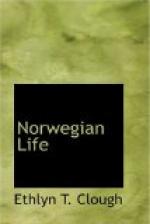“His house was trimmed with green boughs and festooned with ropes of flowers and ground pine. The word farvel, “farewell,” was worked in green over the front door. The coffin, which was carried on a bier by the neighbors to the little cemetery not far away, was covered with flowers, and following it were a number of women clad in somber black with little white shawls tied under their chins, each carrying a wreath in her hands. The minister led the procession. He was dressed in a long black gown reaching to his heels, like the cassock of a Catholic priest; his hat was of felt, with a low crown and a broad brim, similar to those worn by the curates of the Church of England, while around his neck was a linen ruff that looked as if it might have been worn in the time of Queen Elizabeth.
“A grave had been dug in the churchyard. The neighbors who had borne the body, lowered it tenderly to the bottom, and when they had lifted the cover of the coffin in place, each man, the oldest first, threw in a shovelful of earth. All the women did not use the shovel, some of them took up handsful of soil and let it gently filter through their fingers into the open vault; and finally three children, somewhere about ten or eleven years of age, followed the example of their elders and added their little share to the brown coverlid of the dead. The pastor removed his hat, extended his arms and pronounced a benediction. Then the women laid their wreaths on the newly covered grave and sorrowfully turned homeward.”
Independence and frankness characterize all classes of society. Norway has no hereditary aristocracy. In 1821 it was provided that those holding titles might be allowed to retain them during their lives, but they could not transmit them to their children. The Norse character has never been marred by the yoke of slavery. The feudal system, with its serfdom, never got a footing in the north. The people have always been small landholders, which has developed among them an independence of character not found in countries where the mass of the inhabitants have no direct property interests. There is no class in Norway corresponding to the country gentleman of England or to the grand seigneurs and provincial noblemen of the Continent. The wealthiest landlord is only a peasant.
Honesty is one of the valuable assets of the Norwegian people. Attempts at extortion are so rare that tourists, accustomed to the proverbial dishonesty of the Latin races, find travel in Norway and Sweden a joy. An English traveler relates this typical incident: He had lost his purse shortly after leaving Vossevangen for Stalheim. Altogether unconscious of his loss, he walked on placidly. Suddenly hearing hurried footsteps following him, he turned about and faced a lad who thrust the pocketbook into the owner’s hand and disappeared before the Englishman could get a coin from his pocket to reward the boy for his honesty. The Norwegian boy very properly did not expect a reward for doing the only thing open to his mind upon finding the purse.




